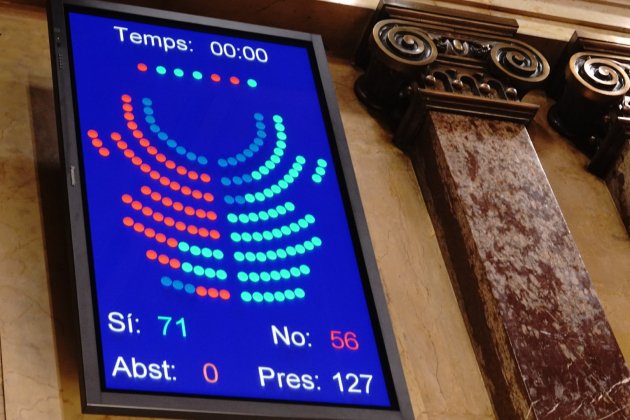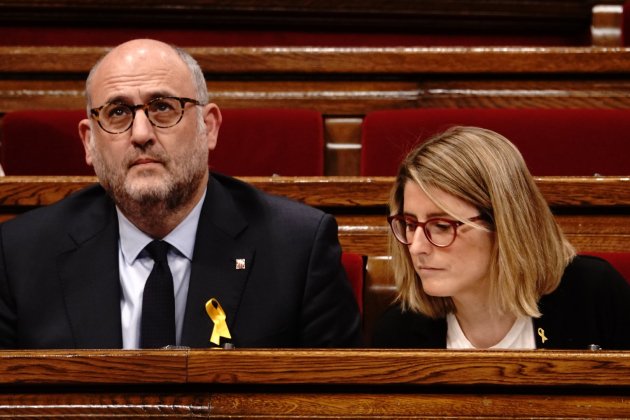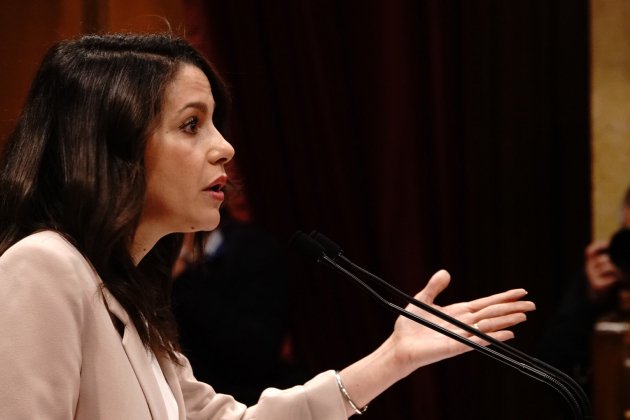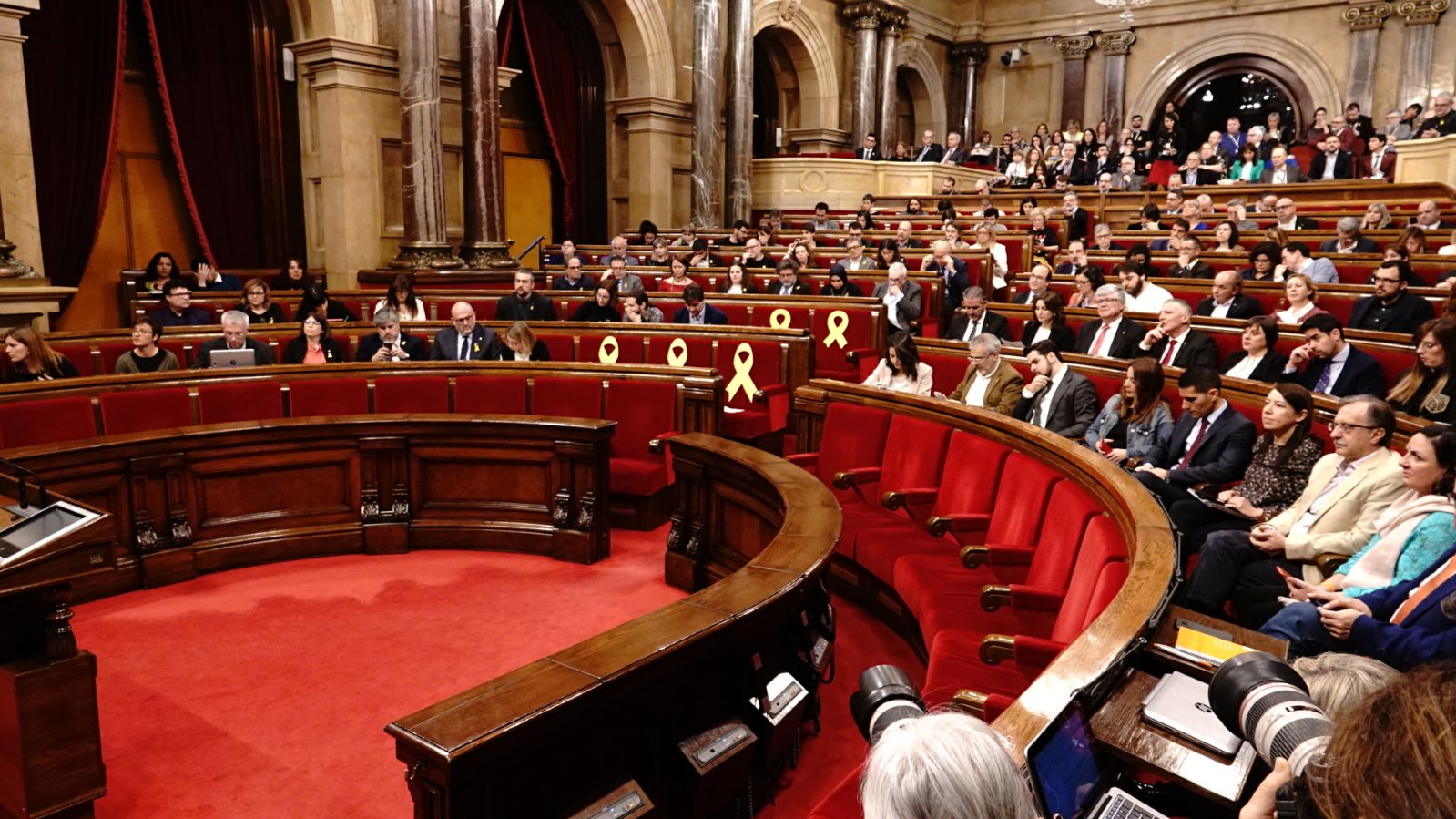The first full meeting of the Catalan parliament since the latest imprisonments of pro-independence leaders and the arrest of Carles Puigdemont in Germany was held in Barcelona this Wednesday. And it served to legitimise the political rights of not only the exiled president, but also of Jordi Sànchez and Jordi Turull, the other two candidates who have been proposed as new leader, both now in prison themselves. Backed by the argument of two human rights complaints which have just been formally admitted for consideration by the UN Human Rights Committee, the pro-independence parliamentary groups resurrected the three candidatures for selection as new president - in the case of Puigdemont, for the second time, after the chamber earlier recognized his right to be sworn in as Catalan leader on 1st March.
The resolutions were passed with the votes in favour of the three-party independence block - Together for Catalonia (JxCat), Catalan Republican Left (ERC) and the Popular Unity Candidature (CUP) - but they also received the support of the left-wing, non-aligned Commons group (CeC-Podem) on several points, such as the motion based on the UN Human Rights committee's recent recommendation to Spain on protecting the rights of the imprisoned Jordi Sànchez. The motion, "requiring the other powers and institutions of the Spanish state to comply effectively with precautionary measures" to protect Sànchez's political rights, even though he is in prison, was passed and was then extended to apply to Puigdemont and Turull. The Commons also supported a motion demanding the release of the Catalan political prisoners - there are now nine of Catalonia's political and civil leaders being held in Spanish jails.
The first proposed resolution was the one relating to Sànchez, urging Parliament to “adopt all necessary measures” to guarantee his political rights, including the right to be invested as president, and requiring all powers of the state to comply with this. The second resolution also sought to guarantee the same rights to Puigdemont and Turull, based on the fact that they meet the “same criteria” as Sànchez. This second motion also demanded the liberation of the political prisoners.

Judicial siege against the election results
In the presentation of the proposed resolution, JxCat, ERC and the CUP denounced the occurrence of a “judicial siege” directed against the results of the Catalan election on 21st December, referring to judicial interferences in the sovereign decisions of the people of Catalonia as expressed at the ballot box, and they criticised that the results of the elections have not been respected.
For JxCat, the deputy Gemma Geis defended Puigdemont's political rights, asserting that his candidature for presdiency will not be abandoned, while also defending the rights of the other two candidates: Jordi Sànchez and Jordi Turull. "The presidency of the Catalan government is not subject to court approval, only to the approval of the Catalan people", she said.
"Democracy has been suspended in the Spanish state". These were the words of ERC's Anna Caula, who declared that parliamentarians "are here to denounce a judicial siege". Caula asserted that the Spanish judicial powers are trying to interfere in the results of the Catalan election and criticised the attitude of Supreme Court judge Pablo Llarena, handling the case of the Catalan independence leaders: "the arbitrator is the most arbitrary", she said.
The CUP demands that Puigdemont be elected president
On the other hand, representative of the radical left CUP, Carles Riera, said that the Spanish state "has hijacked the sovereignty of the people and Parliament", while also criticising the pro-independence majority and the speaker of Parliament, Roger Torrent, for obeying resolutions made by judges with regard to the candidatures for the Catalan presidency. His comments were a reference to the existence of three possible candidates for the office, all from the pro-independence block, which have emerged as a response to the tortuous conditions laid down by Spanish courts on the eligibility of candidates with so-called "legal problems".

However, the CUP's Riera celebrated the fact that JxCat requested the delegation of a proxy vote by Carles Puigdemont - a request which the parliamentary bureau will consider next week - and, with regard to this, he asked for a meeting of parliament to swear in Puigdemont as new president and to restore the Republic declared last October. He also offered to assume the responsibilities and the consequences that were necessary to make this possible. "Making a deal with the state only has one name: surrender", he affirmed.
Cs and PP, bitter
The leader of the Citizens (Cs) party, Inés Arrimadas, did not even move from her seat to make an intervention that was far briefer, and also more churlish, than the rest. She wanted to warn Parliament that it was about to do something “outrageous” in the vote on a specific point. “You intend to vote on who can leave prison”, she said. “What will be next? Voting on who has to go to prison?" Arrimadas affirmed that “the UN has not said that Mr. Sànchez is right”. She also denied that Spain is an “authoritarian and dictatorial” state, and based her claim on statements made by the international institutions.
The same harsh approach was used by the spokesperson of the Popular Party (PP), Xavier Garcia Albiol, who asserted that “the motions and the session in general have two clear goals: to carry on challenging democracy and to satisfy the radicals who are sowing the seeds of conflict in different parts of Catalonia”. Albiol denied that any political prisoners are being held. “Mr. Jordi Sànchez is in prison for attacking a police car”, he argued.

PSC and the Commons, conciliatory
The speech from the Catalan Socialists (PSC) kept its distance from the discourses of Cs and the PP. Spokesperson Ferran Pedret empathised with the suffering of the prisoners and stated that the Socialists also want them freed. However, he specified that the UN has only made “recommendations of a very general character”. And he warned that “an institution like Parliament which is part of legislative power, cannot address itself to judicial power, to tell it what to do”.
The Commons went a step further. Leader Xavier Domènech proposed an alternative government, broad and transversal, with pro-independence figures and a limited mandate, if the pro-independence parties are not able to come to agreement. “We all need to take a step back in order to move forward, a step back for powers and parties in order to take a step forward as a country”, he asserted. The Commons voted in favour of the independence block's resolution asking for the liberation of the prisoners.

